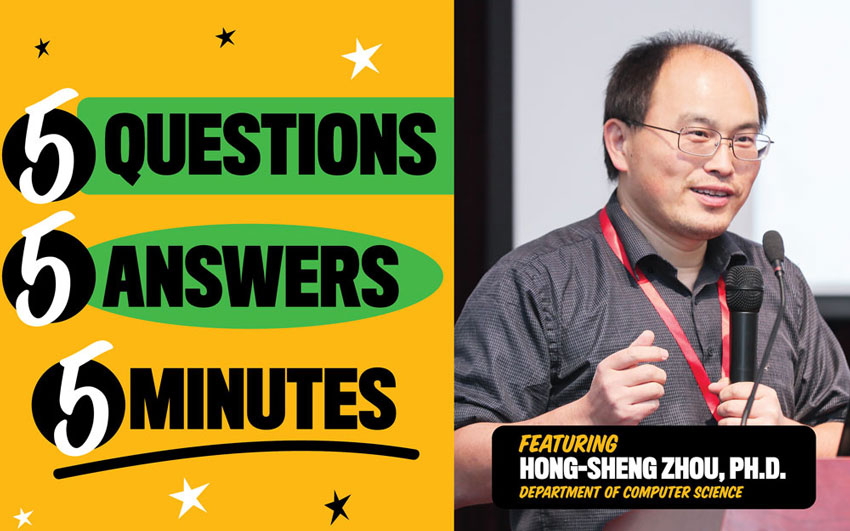Cryptography, with a focus on secure computing and blockchain, is a major research area for Hong-Sheng Zhou, Ph.D., assistant professor in the Department of Computer Science.
1. What are you working on right now?
I am working in multiple directions on cryptography. My main focus is secure computing, with the goal of enabling secure and rich functionalities. This covers a wide range of important topics such as multi-party computation, blockchain technologies, electronic voting, verifiable computation and more. My second focus is extreme cryptography, with the goal of defending against very strong but realistic attacks including leakage and tampering attacks, subversion attacks, coercion attacks and quantum attacks.
2. Tell us how you are investigating this.
Take secure multi-party computation (MPC) as an example. Secure MPC allows mutually distrustful players to jointly compute any efficiently computable function of their private data, (1) without violating the privacy of their data but (2) ensuring the correctness of the computation. Since its introduction in the 1980s, this notion has been extensively studied and has become one of the cornerstones of modern cryptography. I have made efforts to design and introduce new protocols for MPC, and to introduce novel frameworks for analyzing security. Modern cryptography provides new concepts, tools and solutions to balance the power between people, companies and governments, and to support people’s right to freedom. I truly enjoy my research!
3. How will your research make a difference?
A lot of my recent work is in blockchain. Cryptocurrency (e.g., Bitcoin) is a typical application of blockchain. Indeed, blockchain technologies hold the potential to change the way people and companies compute, collaborate and interact in the future. However, there are many technical challenges: Bitcoin requires a huge amount of electricity and computing resources; in addition, the system is very slow — only seven transactions can be processed per second (thousands of times slower than Visa). In a startup project called “Fractal Platform,” we are making efforts to design new blockchain protocols that are high-performance, secure and green.
3. What do you hope to achieve with your work?
Ultimately, my goal is to help create a better, more secure cyberspace. Blockchain technologies will change the world. Beyond the high-performance blockchain protocols in the Fractal Platform project, I have also introduced new design and analysis frameworks as well as novel secure multi-party communications and electronic voting protocols on top of blockchain. I also want to help make blockchain applications more scalable, while still preserving anonymity and regulation. As a researcher and educator, I hope to make people more aware of blockchain and better prepared for its growing presence. I host a blockchain meetup for enthusiasts, investors, entrepreneurs and those who are just curious. I am also teaching a new course called “Cryptocurrency and Blockchain” at VCU. This is one of the first blockchain courses in Virginia.
4. How did you become interested in this work?
I went into computer science as a graduate student, and for years I was focused exclusively on secure multi-party communications. I learned about Bitcoin around 2013, while I was a postdoc at the University of Maryland. I didn’t pay much attention at first. When I started to learn more about the blockchain technology behind Bitcoin, I thought, “This fits my research very well!”
5. Who supports your research?
My research is currently supported by the National Science Foundation (NSF) and multiple industry grants. I was recently selected for a 2018 Google Faculty Research Award.
Fun fact: In my spare time, I am actively working with my 6-year-old son on a project for learning math and computer science at early age. Hopefully, we will be able to create some materials and share them with the public in the near future.
